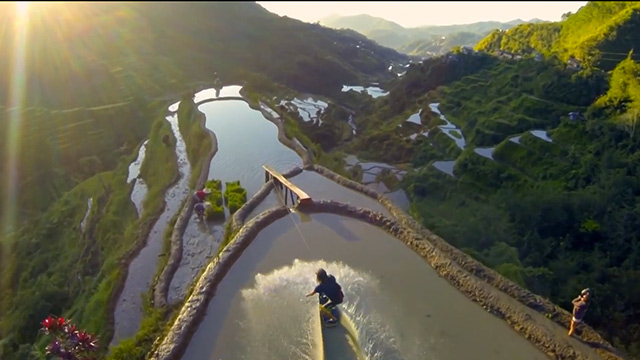SUMMARY
This is AI generated summarization, which may have errors. For context, always refer to the full article.

MANILA, Philippines – Philippine conservationists hit out Sunday, October 27, at a wakeskating “stunt” that took place at an ancient mountain rice terrace, accusing sponsors of exploiting the UNESCO World Heritage site.
Professional wakeskaters Brian Grubb of the United States and Dominik Preisner of Germany are shown on a video on YouTube skimming on the waters of the Banaue rice terraces in the Ifugao province.
Wakeskating is similar to the popular water sport wakeboarding but users are not bound to the board.
“I noticed that on the back of the bills here, you could see all these rice terraces and tonnes of water,” Grubb says in the video, which was uploaded Thursday and already viewed over 241,000 times as of Sunday.
“It’s just a wakeskate paradise but no one even knew it was here.”
Watch the video here:
Although they said they obtained permission from local tribal leaders, the video quickly spread on social media, drawing mixed reactions from Filipinos.
“Wakeboarding at the terraces? It is a stunt totally inappropriate to the site. And stunt it is,” Augusto Villalon, president of International Council on Monuments and Sites (ICOMOS) Philippines, said. “The world heritage property and the local residents should not be exploited.”
Sponsors Red Bull defended the event, saying in a statement attached to the video: “Respect for the environment was a priority from the beginning of this project!
“The team has assured that the plants and wildlife have neither been damaged nor disturbed at any time during the project.
“All agreements have been made together with the locals and under respect of their traditions and culture.”
But heritage conservation architect Joycelyn Mananghaya said the terraced paddies were carved out on the slopes of the Ifugao mountain region by ancient people “for the prime purpose of planting rice”.
“If the intent is to attract tourists and assist in improving the economic conditions of the people, it remains as an activity that is grossly out of place and if encouraged and continues will significantly remove from it the values by which the site has been inscribed in the world heritage list,” she said. –Rappler.com
Add a comment
How does this make you feel?
There are no comments yet. Add your comment to start the conversation.